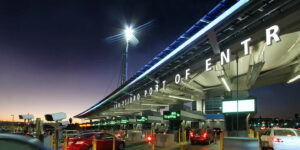August 26, 2020
We advise those crossing for non-essential purposes to reconsider their plans.
On Aug. 21, the Department of Homeland Security and U.S. Customs and Border Protection  implemented protocols at various ports of entry along the U.S.-Mexican border with the intent to discourage non-essential travel. Local ports affected are the San Ysidro, Otay Mesa, and Calexico West land ports of entry. The new protocols call for the closure of multiple vehicle and pedestrian lanes during “peak non-essential travel times” and non-essential travelers may be sent to secondary inspection for further inquiry.
implemented protocols at various ports of entry along the U.S.-Mexican border with the intent to discourage non-essential travel. Local ports affected are the San Ysidro, Otay Mesa, and Calexico West land ports of entry. The new protocols call for the closure of multiple vehicle and pedestrian lanes during “peak non-essential travel times” and non-essential travelers may be sent to secondary inspection for further inquiry.
The Chamber is greatly concerned about these new protocols which increase border wait times and affect more than non-essential travelers . Our essential workforce including those in healthcare, the food industry, and other service sectors are also subject to these extended wait times. The Chamber has dedicated its work to advocating for reduced border wait times which cost our region an estimated $7.2 billion annually in lost economic output. The impacts of wait times extend beyond the economy. They pose a risk to public health through increased air pollution and increased risk of exposure to COVID-19. As we continue advocating for the reopening of businesses under proper health precautions, we will be equally vigilant for safe border reopening . An effective way to mitigate the spread of this disease across our border is a coordinated binational effort around social distancing and regularly wearing a mask.